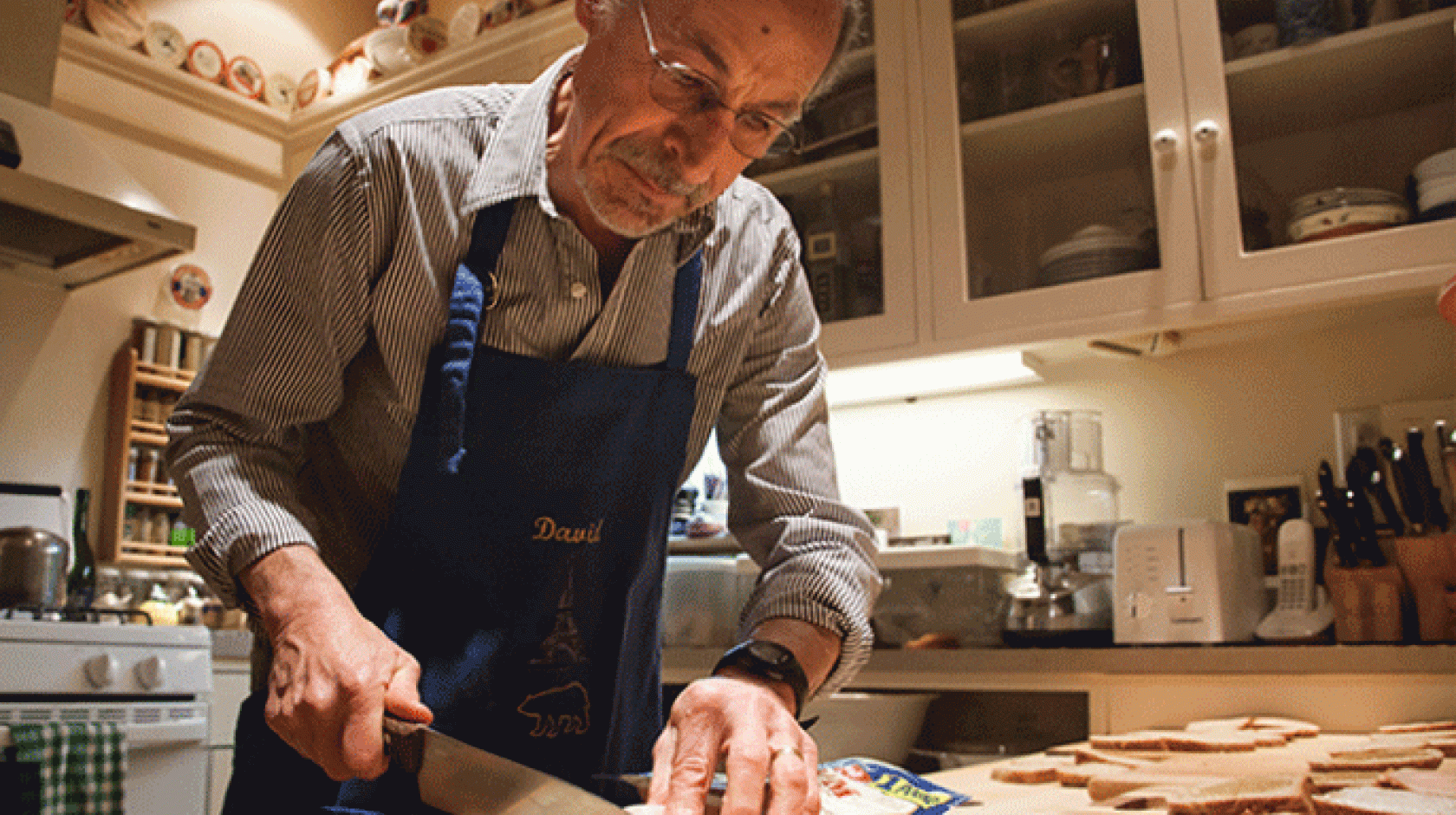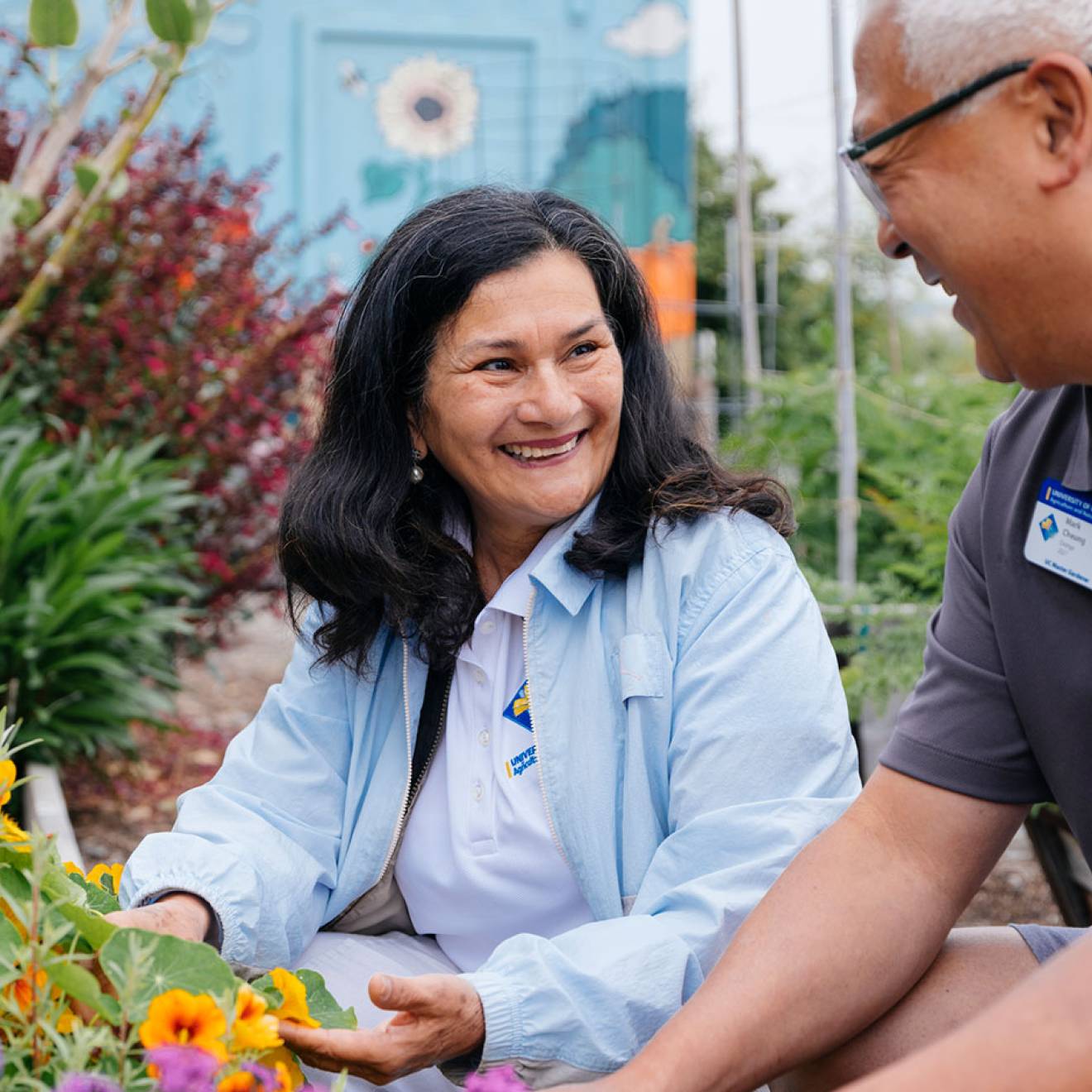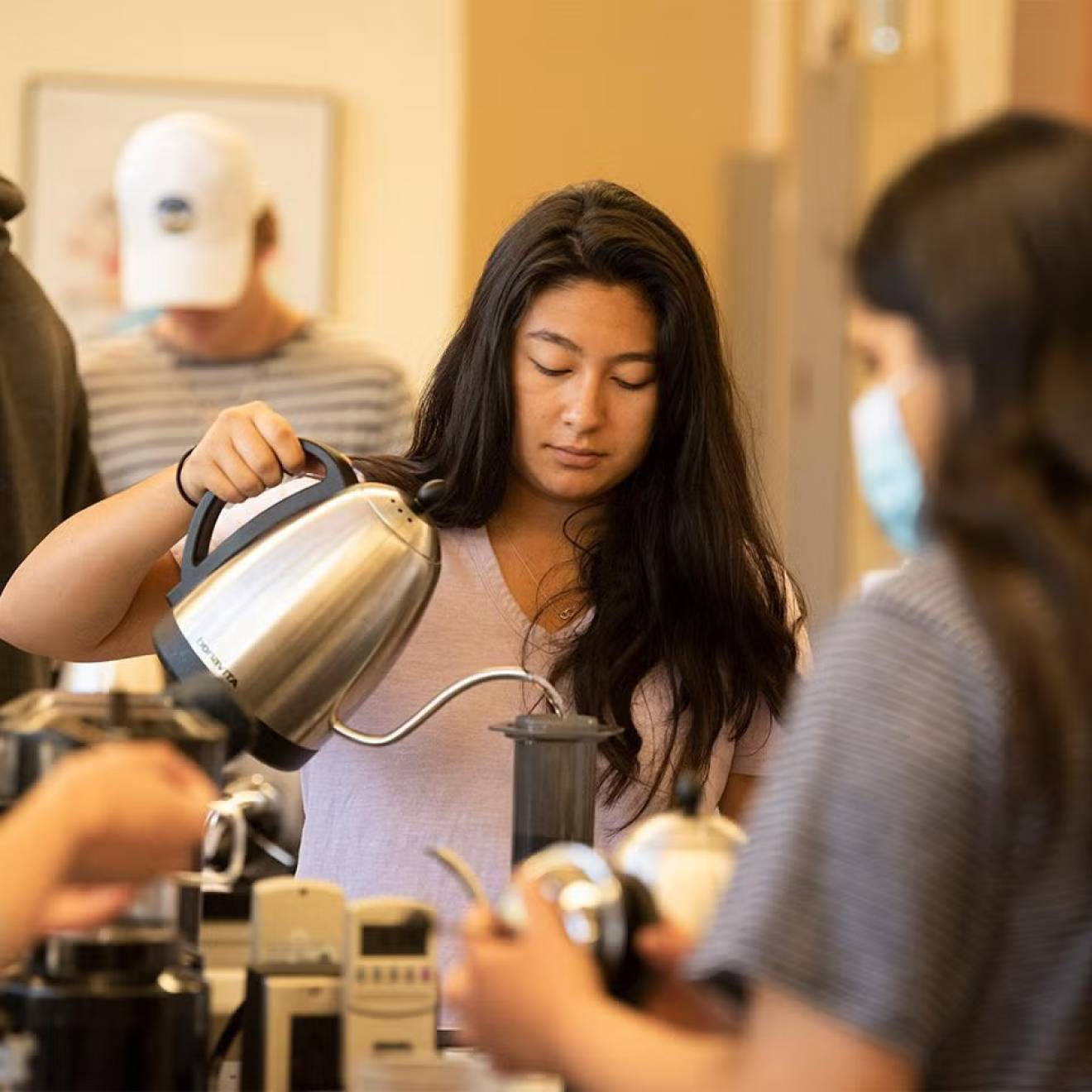Gretchen Kell, UC Berkeley

Before sunrise, swimmers begin arriving at UC Berkeley’s Hearst Pool for workouts, their fins, goggles and caps in tow. Like 67-year-old David Kessler, many are diehard swimmers conditioned to slip out of bed and into the cold water without much thought. But Kessler’s morning ritual begins much earlier, around 5 a.m., in his kitchen in the Oakland hills.
There, as he has for about 40 years, he assembles assorted sandwiches on his homemade bread and packs them in brown paper lunch bags with “two cookies, that’s standard,” says Kessler. Then, he totes to the pool an average of 12 lunches, and occasionally more than twice as many, in large canvas tote bags.
The student lifeguards, who often struggle mightily to arrive for 6 a.m. shifts, are grateful for Kessler, who never fails to personally greet them and hand out the bags, marked with a “Made in David’s Kitchen” stamp, before he swims. He strives to know their names, who eats meat, prefers peanut butter, has food allergies or is lactose-intolerant or vegetarian.
“I’d probably dread the morning shifts without him,” says Ami Stair, a Berkeley senior and lifeguard. “Dave once remembered that I was working at another campus pool that’s also open in the early morning, and he came by just to drop off a sandwich. Definitely made my day.”
Kessler makes about 25 to 30 loaves of bread a week – whole wheat based on hot cereal and white with toasted sesame seeds. When pressed, the former campus library staffer estimates he’s given out “tens of thousands of lunches” in his lifetime.
“I’m very efficient in the kitchen, and if you make your own bread and know how to turn an avocado and a bit of cheese into a heavenly lunch, it’s really not that expensive,” he says. “I know that most of the lifeguards and service desk staff are hard-pressed for money. It’s my way of helping out in getting them through school.”
Originally, Kessler made lunches to ensure that the lifeguards would show up by 6 a.m. to open the pool. But Kessler’s sandwiches – called “Davewiches” by some of his fans – aren’t given for selfish motives. Instead, they’re an invite to the aquatic family he’s been forming at the pool since the late 1970s.
Professors, staff members, students, alumni and community members who swim laps early also receive personalized lunches in designated spots on the deck and group email about pool schedule changes from Kessler – the undisputed hub and, according to one swimmer, “the mayor,“ of the Hearst Pool clan.
“For whatever reason, in whatever way,” says Kessler, “I tend to create community wherever I go.”
“He’s all about creating happiness in other people’s lives,” says former Berkeley head lifeguard Laura Stambach, “and he knows that the stomach is a pretty good route to the heart.”
Daily laps, daily bread
Kessler arrived on campus in the 1970s as a graduate student in history. Born in Brooklyn and raised in Hartford, Connecticut, he headed to the West Coast for better weather, but also because of Berkeley’s free speech and civil rights activism. He soon met Sharon Strocchia, a fellow graduate student who inspired him with her devotion to swimming and baking.
“I was looking for something,” he says, and followed Strocchia’s example, beginning what would become lifetime rituals – daily laps at the pool and regular bread baking. At the time, the Hearst Gymnasium was for women only, but anyone could take a class. He signed up for lifesaving and fencing, and was wowed by the Julia Morgan-designed gym – a 1927 architectural gem with a pool lined in marble and surrounded by classical statuary.
“The Hearst Pool has a fabulous view of central campus to the north,” says Kessler, “and is a great place to watch the sunrise in the east or the sunset to the west. It’s a simpler sister to the amazing Baroque pools at Hearst Castle.”
His baking began with a box of Fisher rye flour. By the late 1970s, he was making daily sandwiches for co-workers at the Main Library, where he had been hired as a library assistant, and for lifeguards at the Hearst Pool. He joined the Bancroft Library staff in 1992.
In the deadly 1991 Oakland firestorm, Kessler and his wife, Nancy, lost their home, kitchen and all. What the couple rebuilt “is perhaps the best explanation of David,” says Matthew Everson, whose wife, Sarah, once was a graduate student and a swimmer on Kessler’s sandwich list.
“Some of those rebuilt homes are ostentatious to the hilt – to me, there’s a lot of ‘look at me’ in them,” says Everson. “David and Nancy built a home that doesn’t try to command your attention. Instead, it blends into the surroundings. You can’t really see it from the road. Inside, it’s homey but not showy, full of books and the smell of bread, and quite peaceful.”
Today, his incinerated loaf pans and baking bowls replaced years ago, Kessler makes bread three times a week, generating up to three large loaves for daily sandwiches, plus smaller loaves to just give away.
“Why is this important to me? Maybe I’m frightened I won’t be loved if I don’t do something like this,” Kessler muses. But if you ask his lunch bunch, there’s no chance of that ever happening.
Living by example
The recipients of these sandwiches – initially surprised, even suspicious, about why Kessler hands them out – eventually find themselves with much more than just good bread.
Yvonne Chi, a 2015 Berkeley Law graduate, got her first sandwich in October 2012. A month later, Kessler introduced her to another morning swimmer, Nathan Leefer, who is now her fiancé. At the time, both Chi and Leefer were dating other people. “When we marry,” she says, “we’ll make sure Dave is there.”
Swimmer Erin Everett, a 2013 graduate, says she cooks nearly all her meals in an iron skillet Kessler gave her from his kitchen when she casually asked him where to buy one. Library staffer Dean Smith says he received Kronos Quartet tickets and a subscription to the Nation from Kessler while he was a graduate student “living less than hand to mouth.”
Former lifeguard Lori Hoolihan and her fiancé were married by Kessler after she shared with him their struggle to create a ceremony that she says blended the groom-to-be’s Catholicism and her “agnostic/atheist” views.” Kessler also brought loaves of bread for the buffet table.
Stambach and undergraduate swimmer Bianca Doerschlag consider Kessler a grandfather. “He was there for me at the pool every morning, rain or shine, when I failed midterms, got injured and ended relationships,” says Stambach. Doerschlag, who admits Kessler’s sandwiches are 30 percent of her diet, calls him “the closest thing to a grandparent at Cal. He genuinely cares.”
“My wife and I were not able to have kids,” Kessler explains. “Certainly ‘adopting’ youngsters at the pool is in some ways a compensation for me. If you met them, you’d want to be close to them, too.”
Such closeness perplexed Everson, who after learning Kessler was giving his wife sandwiches every morning says he wondered, “Who would do that? Nobody does something for nothing anymore. I thought there must be an angle, an ulterior motive.”
“But it isn’t anything other than what we should all do. He’s making people’s lives better each day. He is being an example for others in a quiet, understated, unique and gracious way,” Everson adds. “And he doesn’t ask for a favor in return.”

